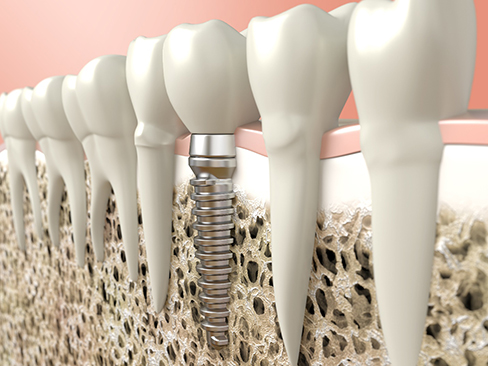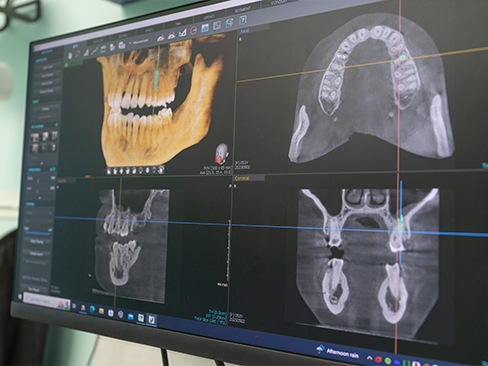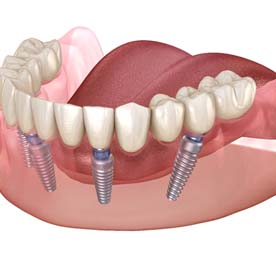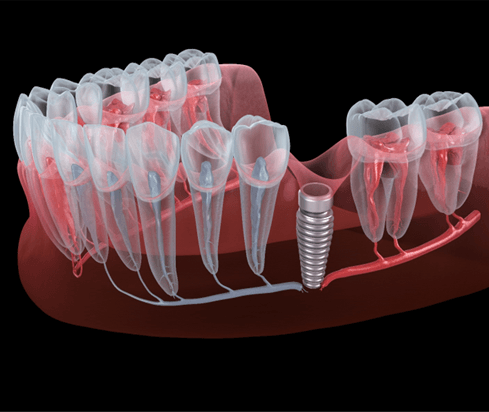
Dental Implants - Garland, TX
A Better Way to Fill in Gaps in Your Smile
Missing teeth are more than just an inconvenience when eating, speaking or smiling; they can also cause your jawbone to deteriorate due to a lack of stimulation from chewing. To prevent this problem, small metal posts called dental implants can be used to replace the roots of the tooth in the jaw while supporting a porcelain crown, bridge or denture; this way, you can restore functionality to your mouth while protecting your overall oral health. If you’ve got a gap in your smile, contact La Prada Family Dentistry of Garland today to ask about getting dental implants in Garland, TX.

Why Choose La Prada Family Dentistry of Garland for Dental Implants?
- Natural-looking porcelain restorations
- Open on Saturday and until 7:00 on weekdays
- Experienced and knowledgeable dentists
What Are Dental Implants?

Instead of resting on the gumline like a traditional denture or bridge, a dental implant replaces the entire structure of the missing tooth. This titanium, screwlike implant is placed directly into the jawbone where it will fuse in a process called “osseointegration.” This gives dental implants a very sturdy foundation so they can reliably support any number of replacement teeth! Because dental implants are able to replace the roots of the teeth, the result will feel like you were never missing your pearly whites at all!
The 4-Step Dental Implant Process

As you may have expected, getting dental implants requires a lengthier treatment process than dentures or bridges do. However, when you consider the fact that implants can last for much longer, improve your oral health, and look and feel impeccably lifelike, you’ll discover that this solution is well worth the wait!
Here at La Prada Family Dentistry, we’re able to complete every phase of the dental implant treatment process under one roof, ensuring your care is as convenient and personalized as possible. While every patient’s experience is slightly different, you can expect these four basic steps when getting dental implants in Garland.
Initial Dental Implant Consultation

To start your journey toward completing your smile, you’ll first need to attend a dental implant consultation. One of our dentists will discuss the goals you have for your future smile, review your medical history, evaluate your current oral health, and take digital images of your mouth and jaws. At that point, they can determine whether you’re eligible for dental implants. Even if you don’t qualify immediately, you may be able to become a candidate by completing one or more preliminary treatments, such as bone grafting or tooth extractions.
You’ll have an opportunity to ask questions about how dental implants work in Garland and what to expect throughout the process. Once we’ve drawn up a treatment plan, we’ll provide a customized timeline and price estimate so that you’re not faced with any unpleasant surprises later on.
Dental Implant Surgery

As far as oral surgeries go, dental implant placement is relatively straightforward. First, our team will administer a local anesthetic to completely numb your mouth and jaw, as well as sedation to soothe your nerves. We’ll make tiny incisions in your gums so that we can insert the implant posts at specific, pre-planned locations in your jaw. Then, we’ll attach healing caps to protect the implants as you heal before closing your gum tissue back up.
Dental Implant Osseointegration & Abutment

While you should feel fully recovered within a week after your surgery, you’ll need to wait for at least three to six months for your jawbone to finish bonding with the implants. This process, called osseointegration, is what enables dental implants to be sturdy and potentially permanent.
After osseointegration, you’ll most likely need to undergo another surgical procedure, this one more minor. Your implant dentist in Garland will attach small metal pieces called abutments to the tops of the posts, which will secure your prosthetic teeth in place. Recovering from the abutment surgery should only take a few short weeks.
Delivery of Dental Implant Restoration(s)

Once your restorations, or replacement teeth, have arrived from the dental lab, we can place them on your abutments. When your brand-new dental crown, bridge, or denture is in place, your new smile is complete!
Benefits of Dental Implants

Replacing teeth has benefits for your oral and overall health in its own right, but you can expect even more quality of life improvements when you choose dental implants to get the job done. Below, you can read about some of the most common benefits you can expect following your dental implant treatment. Everything from boosts in your mood to your appearance to your mouth’s functionality and more can be found. If you’d like to learn more about how dental implants can help you, please give La Prada Family Dentistry of Garland a call!
Day-to-Day Benefits

- A Natural Feel and a Natural Look: Your implants will naturally integrate with the jawbone for improved stability and chewing power. Not only will it function and feel like a natural tooth, but thanks to the porcelain restoration, it helps create a natural-looking smile as well.
- Easy At-Home Oral Care: When it comes time to practice your brushing and flossing, you’ll be surprised to learn how similar it feels compared to having your original teeth. There’s no need to remove your dental implants just to keep your mouth clean.
- Enjoy Your Favorite Meals: Because dental implants integrate with your existing bone tissue, chewing your favorite foods feels natural and easy to perform. Even tough, chewy, or crunchy foods like steak and apples don’t stand a chance to dental implants!
Health Benefits

- Prevent Bone Loss: The implant will stop the bone from deteriorating, which makes it easier to maintain a youthful-looking facial structure. This is because blood flow to the cheeks dramatically improves after the implants are placed.
- Reduce Your Risk of Future Tooth Loss: Another common side effect of tooth loss is the loss of additional teeth. This is because once teeth are removed, bone tissue is not being stimulated enough to maintain its structure. This damages the foundation of bone responsible for holding existing teeth. By placing implants, you prevent this side effect from occurring.
- Achieve More Balanced and Diverse Nutrition: While it’s easy to eat more foods in general with dental implants, getting a healthy balance of your essential nutrients is also more convenient. You won’t have to worry about preparing food in a way just so they can accommodate your tooth replacement.
Long-Term Benefits

- Long-Lasting: While crowns, bridges and dentures periodically need replacement, a dental implant can last a lifetime with the right maintenance. This can help you save money in the long-term as well since you won’t need to replace your teeth every several years (which is common for dentures and even bridges).
- High Success Rates: On average, dental implants maintain a success rate as high as 98%, even after they’ve been inside the mouth for 10 years. This makes them one of the most reliable options for replacing teeth.
- Avoid Dental Drift : Over time, teeth can shift out of place in order to compensate for the extra space when teeth are lost. By placing a dental implant inside the gap, you prevent neighboring teeth from moving and making your bite uneven. Uneven bites can increase your risk of jaw joint pain as well as cause natural teeth to rub against each other.
Who Dental Implants Can Help

Many patients are surprised to learn just how versatile dental implants in Garland are. As long as a patient is in generally good health, there’s a very good chance that they can receive dental implants no matter how many teeth they’ve lost. Once you attend an initial consultation with one of our dentists, we can let you know whether you’re a good candidate, and if you’re not, we may be able to take certain steps to get you there. Read on below to learn more about whether dental implants can help you!
Who Is a Good Candidate for Dental Implants?

These days, more patients than ever before are eligible to have their missing teeth replaced with dental implants. However, there are a few prerequisites that must be met beforehand. For one, a patient will need to be free of gum disease or decay in their remaining teeth, as these issues could compromise implants if they were to be placed. If your dental implant dentist in Garland detects any oral health concerns, they’ll arrange for preparatory procedures, such as gum disease therapy or tooth extractions, prior to moving forward with dental implant surgery.
Additionally, dental implants require an adequate amount of healthy bone tissue in the jaw; otherwise, they won’t have a strong enough foundation with which to integrate. It’s normal for the jawbone to deteriorate following tooth loss, but we can remedy the situation by scheduling a bone grafting procedure. After more bone mass has been added to the jaw, it should be dense enough to support any number of implants.
Once you’ve been cleared to continue with the dental implant process, we can plan out your treatment based on how many teeth you’re replacing.
Missing One Tooth

If a single tooth is missing, it can be brought back using one implant post paired with a lifelike, custom-crafted dental crown. The implant is vertically positioned in the space where the tooth once was, and the crown is secured on top. Not only does this solution look and feel exactly like the tooth you used to have, but it is fully self-supporting. As a result, it’s a more conservative way to replace a single missing tooth than a dental bridge, which requires shaving down two of the remaining teeth for support.
Missing Multiple Teeth

Patients who are missing a few teeth in a row will be happy to learn that they probably won’t need to receive one implant for each individual tooth. Instead, several consecutive lost teeth can be replaced with just two dental implants. Each of the posts is positioned at one side of the gap, and together, they hold a dental bridge in place. Unlike a traditional bridge, an implant bridge doesn’t modify any of your natural teeth, and it’s also much stabler and longer-lasting.
Missing All Teeth

If all of the teeth on your top and/or bottom arch are missing, you may have considered getting dentures; maybe you currently wear them. While conventional dentures can look quite natural, they eventually lose their fit due to jawbone loss. By securing a full denture onto dental implants, you can keep your jawbone strong while avoiding slippage, dietary limitations, discomfort, and all of the other common complaints among denture wearers. In most cases, it takes somewhere between four and eight posts to support an implant denture, which can give you a flawlessly lifelike smile for decades to come.
Understanding the Cost of Dental Implants

Dental implants offer lifelike, long-lasting results, and these effective smile restorations require patients to make a larger investment of time and money upfront than other solutions. Since no two treatment plans are exactly alike, our team at La Prada Family Dentistry of Garland will walk you through every step and the price associated with each before we begin restoring your smile. With this in mind, keep reading to learn some of the factors that influence the cost of dental implants in Garland, and contact our team with any further questions.
Preliminary Treatments & Dental Implant Surgery

If you have existing oral health problems, you'll likely need preliminary treatments before moving forward with the dental implant process. Even though services like gum disease therapy, tooth extractions, and bone grafting will add to the overall cost of your treatment, depending on your case they can be necessary to maximize the lifespan of your new smile. Fortunately, most of them are partially covered by dental insurance.
Keep in mind that dental implant surgery has a cost of its own. We are partnered with the best local oral surgeons who specialize in implant placement, so you can rest assured that you are investing in what will be a quality result for your smile.
The Parts of Your Dental Implant

When it comes to dental implants in Garland, the cost is affected by multiple factors including:
- Material – Implants made of zirconia instead of titanium typically cost less.
- Brand – Manufacturers make dental implants differently based on the needs of each patient. Be sure to ask your implant dentist in Garland where you’re getting yours from as well as any brand-specific benefits.
- Number of Dental Implants – Obviously, replacing a single missing tooth with one dental implant will cost less than replacing an entire row with an implant denture.
- Type of Restoration – Crowns, bridges, and dentures each cost different amounts. Expense corresponds to the size of the restoration.
How Dental Implants Can Save You Money

Patients on a budget often choose dentures or dental bridges as their method of tooth replacement because they’re cost-effective. Even though dental implants have a higher upfront cost, they end up paying for themselves over time. For example, you won’t need to pay for replacements or adjustments every few years.
You also don’t have to worry about purchasing special pastes, solutions, or other products to maintain your rebuilt grin. All you must do is care for your implants like you would for your natural teeth! Since they’re easier to maintain, you can more easily avoid oral health issues that would require costly dental treatment.
Does My Dental Insurance Cover Dental Implants?

Most dental insurance plans do not offer coverage for dental implants. However, there are some exceptions. Certain parts of the final restoration or your preliminary treatments might be eligible for coverage. Before committing to anything, contact your insurance provider to confirm the details of your coverage. Our team is happy to help with that step if needed!
Making Dental Implants Affordable

Don’t have dental insurance? No problem! We work with third-party financiers to help make your dental bills much easier to manage. With CareCredit and Sunbit, you can sign up for low-to-no interest payment plans to break up the overall cost of your treatment into smaller monthly installments. Also, consider our membership plan, which provides you with a 20 percent discount on all non-orthodontic treatments!
Dental Implant Failure and Salvage

No one expects their dental implants to fail, and we’ll take the necessary precautions to help you avoid that outcome. On rare occasions, though, you might end up with dental implants that are loose or broken for one reason or another, and you’ll need to act quickly if you want to salvage it. Get in touch with us; we’ll help determine the treatments you need as well as whether saving your implant posts is an option.
Dental Implant Post-Op Instructions

Following implant placement, you can’t just go about your life as usual. Your mouth needs time to heal from the surgery. That said, this recovery isn’t anything to worry about. We at La Prada Family Dentistry are here to guide you through it. Below, our office has listed dental implant post-op instructions for you to use. They’ll tell you what to expect after treatment, including typical symptoms and ways to help your smile heal. If you experience strange side effects or intense pain, though, contact us.
What to Do Directly After Dental Implant Surgery

Directly after implant surgery, your highest priority is to leave the forming blood clot untouched. (Doing so ensures the healing process goes smoothly.) So, remember to follow these rules:
- Don’t spit your saliva. If an excess builds up, swallow it or use a tissue for dabbing.
- Avoid drinking straws. Their suction force could dislodge your blood clot.
- At least for the first day following surgery, don’t smoke.
- Try not to touch the surgical site with your fingers or tongue.
Common Side Effects When Recovering from Dental Implant Placement

For the first few days after implant placement, you’ll likely experience some mild side effects. They may include the following:
- Intermittent bleeding – Near the implant site, there may be occasional bleeding. You can reduce it by applying gauze and light pressure.
- Gum or Facial Swelling – In the first 72 hours post-surgery, your gums could swell a bit. Should that happen, use a cold compress.
- General Discomfort – Your mouth may feel slightly achy once the anesthesia wears off. To manage it, take some store-bought pain relievers.
Rest assured, these effects are temporary and subside with time. If that’s ever not the case, let us know.
Your Diet After Dental Implant Surgery

To avoid irritating the treatment site, follow a soft food diet for a few days after surgery. Items with hard or abrasive textures could interfere with implant fusion.
Examples of soft foods to include are:
- Scrambled eggs
- Mashed potatoes
- (Non-hot) Soup
- Yogurt
- Ice cream
- Pasta
- Pudding
You can return to your normal diet once you feel up to it. Even then, though, we suggest limiting crunchy and tough foods. You also shouldn’t chew directly on the implant site(s).
Post-Op Health & Oral Hygiene

Even as you act gently with your mouth, it still needs cleaning during recovery. So, stick to good oral hygiene as always; just make minor changes so healing continues properly.
For instance, you can brush your teeth as usual. Just exercise caution when you reach the surgical site. (You don’t want to dislodge the blood clot!)
Meanwhile, alter your mouth rinse approach. A mouthwash high in alcohol can cause extra problems. Therefore, rinse twice daily with salt water instead. This habit will reduce post-surgery inflammation.
What to Do After Your New Teeth Are Attached

The hard part is already over once your new crown, bridge, or denture is added. You may feel some mild sensitivity, but you can control this pain with medication. It shouldn’t cause any swelling, bleeding, or extensive recovery. On the contrary, you’ll be ready to show off your newly restored smile!
Maintaining & Caring for Your Dental Implants

Your new dental implants can keep your smile complete and strong for a lifetime. However, for your implants to last this long, you must be taking care of them. If you don’t protect your implants from damage and infection, you could experience dental implant failure. Here are some precautions and healthy habits to implement so you can show off your complete smile for many decades down the road!
Making Oral Hygiene a Priority

Dental implants are not made from tooth enamel, so they can’t get cavities. However, the teeth around them still can and you can still develop gum disease. Remember to brush twice, floss, and rinse with mouthwash every day to keep your teeth clean and your mouth fresh!
Eat a Healthy Diet

When you have dental implants, you don’t have to worry about limiting your diet. You can enjoy all the nutritious food you’d like! However, it pays to be mindful of the items you are consuming. You should avoid overindulging in hard, sticky, or sugary goods. Remember to eat foods with plenty of calcium and vitamin C to keep your jawbone strong and your gum tissues healthy.
Break Bad Habits

Bad dental habits can cause complications with your dental implants. You should refrain from smoking and using tobacco products, as they slow healing and encourage infection. You also shouldn’t use your teeth as tools. Instead, use a bottle opener, scissors, or another item to help you complete your task without risking the health of your smile.
Protect Your Dental Implants

Dental implants are very strong, but they aren’t completely indestructible. If you participate in contact sports, make sure to always wear a mouthguard to protect your teeth. If you grind your teeth while you sleep, you may want to look into getting a nightguard to protect your smile from the extra wear and tear.
Schedule Regular Dental Checkups

You should continue to see us for cleanings and checkups every six months. This way, we can monitor your implants and spot any issues as early as possible. The earlier that problems are detected, the better chance we have of correcting them.
Dental Implant FAQs
Are Dental Implants Safe?
For the majority of patients who are in good health, dental implants are perfectly safe when placed by a skilled, qualified professional. If you have low jawbone density or gum disease, your dentist will need to address these issues beforehand to make dental implant surgery safer and more successful. If you have diabetes, cancer, or other medical conditions that could make surgery and/or healing risky, we will discuss them during your consultation. Your health is always our top priority.
What Can Cause Dental Implants to Fail?
Dental implant failure is very uncommon, but it’s possible. There are two main reasons that this occurs. The more common is peri-implantitis. This is a form of gum disease that develops from poor oral hygiene and can damage the bone and gums supporting the implant. Sometimes, the implant may fail to integrate with the jawbone, particularly if the patient has low jawbone dentistry to begin with. Other causes of dental implant failure can include certain medications, health conditions, chronic teeth grinding, tobacco use, and more. Your dentist will provide you with guidelines for minimizing your risk of dental implant failure.
How Long Does It Take to Recover from Dental Implant Surgery?
You should be able to resume your normal activities the day after your surgery. However, you should avoid strenuous exercise for the first week or so because it can slow down the healing process. Bleeding should stop after the first couple of days, and swelling should cease after about three to four days. Take prescribed and over-the-counter pain relievers as directed. It could take up to six months for your implants to completely fuse with the jawbone.
Will People Be Able to Tell That I Have Dental Implants?
Your dental implants are custom-made based on impressions of your mouth. Once your restorations are placed, no one should be able to differentiate them from your natural teeth. Implants are placed in the jaw, like tooth roots. You won’t need to hold your jaw unnaturally to keep them in place either, as they are very stable!
Does Getting Dental Implants Hurt?
Despite how scary the prospect seems, there’s actually very little—if any—pain during the dental implant surgical process. We use local anesthetic to fully numb the area, and nitrous oxide sedation is available for patients who feel anxious. This ensures a smooth, stress-free experience with minimal discomfort.
After the procedure, some soreness is normal, but it's usually mild enough to be managed with over-the-counter pain relievers. We'll also give you detailed aftercare instructions to help you heal comfortably. If you ever feel unsure or uncomfortable, our team is just a call away to support you through recovery.
Am I Too Old to Get Dental Implants?
There’s no upper age limit for dental implants. In fact, many older adults make great candidates because they’re more motivated to comply with maintenance and follow-ups. If you’re healthy enough to undergo minor oral surgery, chances are good that implants will work for you.
At La Prada Family Dentistry of Garland, we’ll assess your bone health, discuss relevant medical history, and talk about goals to see if implants are a good fit. Whether you're 45 or 75, dental implants can help restore your smile and improve your quality of life. If you’ve been told you’re “too old” at another practice, come in for a second opinion. We’d love to help.
How Successful Are Dental Implants?
Dental implants have a success rate of over 95 percent thanks to careful planning, advanced technology, and good oral care. At our Garland practice, we use tools like the iTero Scanner for precise impressions and CBCT imaging to map out the ideal placement.
This allows us to increase the success of your treatment before moving forward with the surgery. Once your fixture is placed and healing begins, keeping up with your oral care routine will ensure it fuses with your jawbone properly. With a strong foundation, you’ll be able to enjoy the benefits of your dental implants for decades, or even a lifetime!
I Need a Checkup & Cleaning I am Looking for a Dentist for My Child I am Concerned About Bleeding Gums I Have a Cavity or Broken Tooth I am Unhappy with My Smile I Want a Straighter Smile I am Afraid/Anxious of the Dentist I am in Pain & Need Help I Need My Wisdom Teeth Removed View
Our Services



